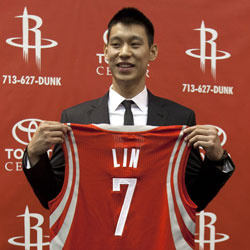Houston Rockets
For Rockets, pushing Parsons to early free agency suddenly makes sense
Given Houston’s new contender status, the Rockets might be best served by making Chandler Parsons a free agent next summer.
Published
12 years agoon
By
Ben DuBose
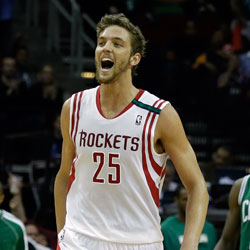
Chandler Parsons has several reasons to be excited about his future in Houston, including a new contract in either 2014 or 2015.
Restricted in 2014, or unrestricted in 2015?
That’s the Rockets’ dilemma with the future of Chandler Parsons, as outlined in April by our own David Weiner. The 2014 scenario, which means declining Chandler’s option for 2014-15 and allowing him to hit restricted free agency, would give the Rockets the right to match any outside offer and likely result in a more team-friendly contract.
Meanwhile, the 2015 route would offer future cap flexibility by giving Houston two more seasons of cheap labor (sub-$1 million) from Parsons along with a miniscule July 2015 cap hold of $1.8 million.
From a broad standpoint, both have their pros and cons — and before the arrival of Dwight Howard, I was leaning to the 2015 scenario. But with a second foundational piece in place, it seems likely that Parsons could hit the open market via restricted free agency next summer. Here’s why:
The Rockets should acquire more key players before mid-2015
Before Howard’s arrival, the thought was that July 2015 could be another opportunity for the Rockets to add a max player, given the expiring contracts of Jeremy Lin, Omer Asik and most others on the current roster. But for a contender, cap flexibility has a price. Look at Mark Cuban and the Mavericks, who had to dismantle their 2011 championship team in order to have max-level flexibility.
With Howard and James Harden locked in, the Rockets have over $38 million in guaranteed 2015-16 salaries just between those two. Let’s hypothetically add in a $1.8 million cap hold for Parsons, then minimum cap holds ($500K each) for the other nine roster spots, totaling about $6.3 million. That’s $44.3 million in committed salary in July 2015, even if the Rockets apply a Cuban-esque philosophy of no extensions and no signings beyond a year.
The salary cap was at $58.6 million this summer. Let’s assume a modest increase to around $62 million by July 2015, giving the Rockets just over $17 million in cap room in the most optimistic scenario. That means that over the next two years, acquiring or extending even one player with a contract beyond 2015 would take the Rockets below max room, thus defeating most of the purpose.
With the Rockets now a contender and firmly in “win now” mode, I expect further acquisitions to happen. I think Daryl Morey will use the full mid-level exception (MLE) to bring in talent next summer. I expect that Asik will ultimately be moved in a package for a power forward, by February 2015 at the latest. I assume the Rockets will be as aggressive as they can to immediately build the best supporting cast, which probably means bringing in players with contracts beyond 2015. In turn, the importance of “cap flexibility” will be somewhat reduced as it pertains to the timing of Parsons’ deal.
Daryl Morey owns restricted free agency
Just ask Kyle Lowry and the rest of the NBA. The centerpiece to the Harden deal was the innovative “guaranteed lottery pick” that Morey acquired from Toronto. Why did the Raptors give it up? Because Lowry was a good starter on an extremely-friendly contract, which Morey set the terms for by leveraging Lowry’s restricted status and allowing Cleveland to “set the market” in July 2010.
(It could be noted that the Rockets re-signed Luis Scola, also a restricted free agent that same summer, to a four-year deal with a partially guaranteed fifth year. While Scola’s faster-than-expected decline led to his eventual amnesty, most considered it a fair market deal at the time.)
Quite simply, if rival teams believe their offer to a restricted free agent will be matched, they’re less likely to make an offer in the first place. Many aren’t willing to tie up their free-agent money for up to two weeks (at least part of the 10-day moratorium, plus the 72-hour period after signing the offer sheet) over a low probability. That leads to fewer teams in the market for that player, and ultimately a lower contract based on reduced competition.
It worked for the Rockets with Lowry, who ended up signing a four-year deal for just above MLE money, and it could help with Parsons as well. At the least, the deal would be on friendlier terms for the Rockets than if Parsons hit the market as an unrestricted free agent in July 2015.
Lin, Asik processes unlikely to be repeated with Parsons
It is true that Lin and Asik jumped teams as restricted free agents, but their situations were not comparable to the one with Parsons. The reason the “poison pill” approach worked on the Knicks when Jeremy Lin was restricted is because New York didn’t have Lin’s full Bird rights. The most the Knicks could offer was a four-year, MLE deal (about $24 million). Both sides knew Lin had to go elsewhere to sign a richer offer sheet, even though Lin planned to return and the Knicks intended to match any offer. Then, of course, Morey added the steep third-year increase, and New York balked.
It’s different with Parsons because he will have been under the same contract in Houston for three seasons, thus giving the Rockets full Bird rights and allowing them to exceed the salary cap to re-sign him at any amount. Likewise, because of his tenure, Parsons is not subject to the “Gilbert Arenas rule” that Lin and Asik were, which allowed those offer sheets.
In the end, Parsons — unlike Lin — doesn’t need to sign elsewhere to get above-MLE money. If he wants to stay in Houston, as it appears he does, he and new agent Dan Fegan can shop themselves to the rest of the league and then take the best offer back to the Rockets. Houston could then offer the same “total value” deal itself and without any poison pill, trade kicker or other tomfoolery.
The Boozer risk
Yes, it’s possible that making Parsons a restricted free agent could expose the Rockets to a situation in which another team offers him a ludicrously large contract, much like Utah with Carlos Boozer after Cleveland allowed Boozer to prematurely exit his original contract during the summer of 2004. But that risk could be even greater should Parsons become an unrestricted free agent in July 2015 and engage in a true “bidding war” format. There are no guarantees in free agency, even restricted, but Morey’s ability to relentlessly tell the league that he can and will match all offers (as he did with Lowry and Scola) seems likely to scare away the most intense poachers.
Would Chandler still be happy if the Rockets play hardball?
Probably. While he’d ultimately get a richer “total value” deal if he waited until 2015, a deal in 2014 would substantially boost his 2014-15 salary from $964,000 to somewhere in the neighborhood of $7 million. That would likely offset any loss in overall value and keep both he and Fegan on good terms with club management. Morey and owner Les Alexander could frame the negotiations as a “reward” for Parsons, since they would be giving him a rich contract a year earlier than required.
What if Parsons is ultimately trade bait?
There’s a theory in some Rockets’ fan circles — one that I don’t agree with — that Parsons will ultimately be traded once he becomes too expensive. The logic is to either save Les Alexander a steep luxury tax bill or to eventually package Parsons in a deal for a third All-Star piece.
Even under that hypothetical, my guess is that Parsons is more desirable on a fair long-term contract than a short-term deal at $1 million. Teams won’t trade significant value for a young, Fegan-controlled player entering unrestricted free agency. The risk is too high. But if Parsons signs a reasonable deal (4 years, $30 million?), his market value could be comparable to Lowry’s or even better.
So if not via free agency, how do the Rockets get a third star?
The ideal route is for Parsons or Lin to develop into one. But even if neither does, a package of Asik/Lin, prospects and draft picks isn’t a bad trade offer, especially if the player in question (LaMarcus Aldridge?) is pulling strings behind the scenes to leverage his way to Houston. See Dwight Howard’s August 2012 trade to the Lakers as a primary example of how much power superstars can ultimately wield, even when they’re under contract.
The bottom line is that with two All-Star talents in the fold, the price of retaining cap flexibility is likely too high. The Rockets are in contending mode and will do everything they can to immediately build a championship supporting cast around Harden and Howard. In the case of Parsons, that means finding the most team-friendly contract possible, which probably comes via restricted free agency.
You may like
-
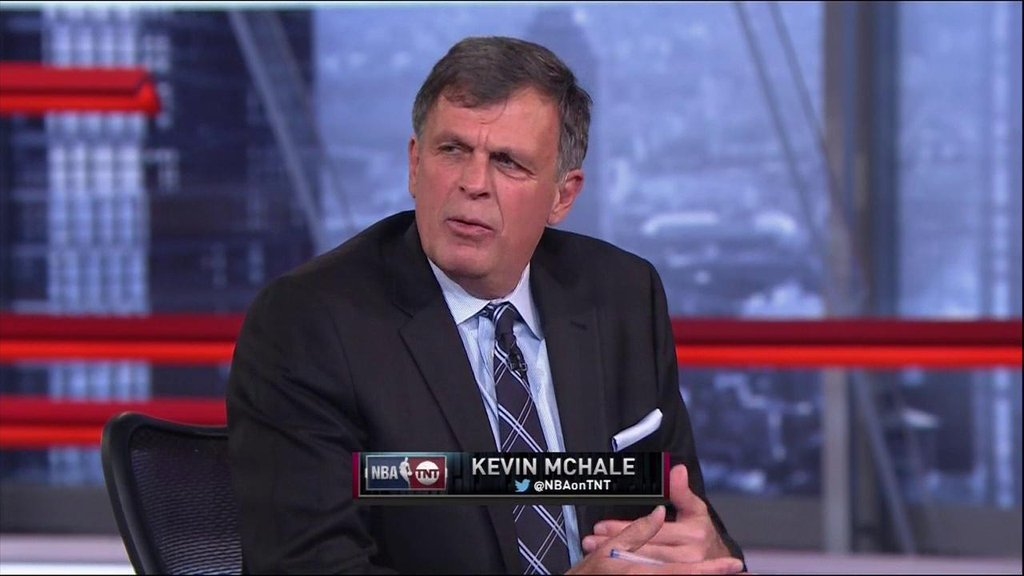

Former coach Kevin McHale discusses his firing from the Rockets
-
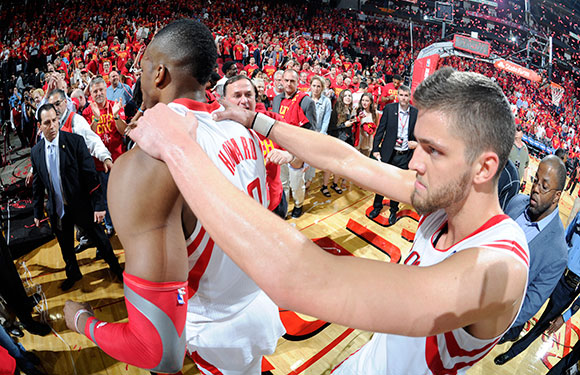

Rockets honored Dwight agreement with agent in letting Parsons out of his contract
-
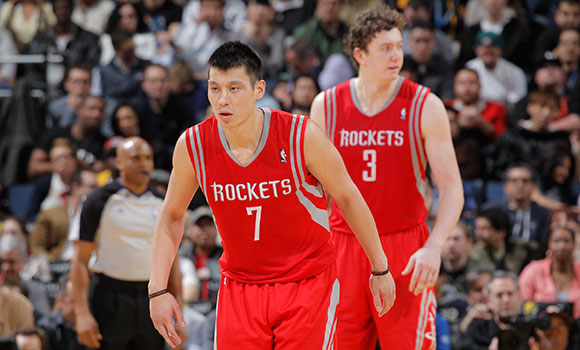

Hey, Remember when Jeremy Lin and Omer Asik were on the Rockets?
-
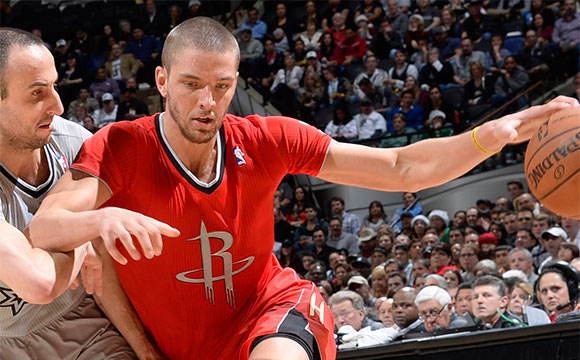

The Chandler Parsons Contract: Salary Cap Implications of Exercising or Declining the Team Option
-
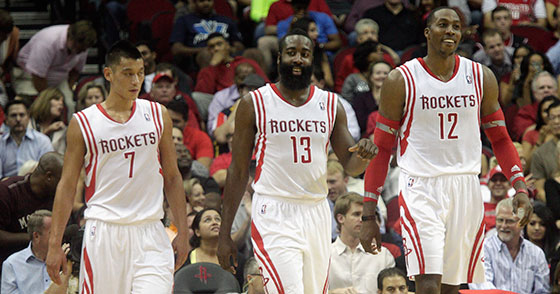

Conspiracy Theories Be Damned – Just Enjoy The Game
-
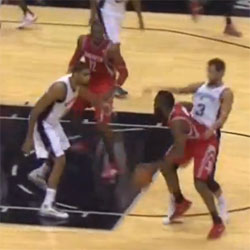

Harden, Howard show signs of real chemistry in dominating Spurs
Houston Rockets
Looking Back on the Trade for Phoenix’s Draft Picks
Are the Rockets set to cash in on Phoenix’s downfall or could a Suns retool murky the waters?
Published
4 months agoon
March 12, 2025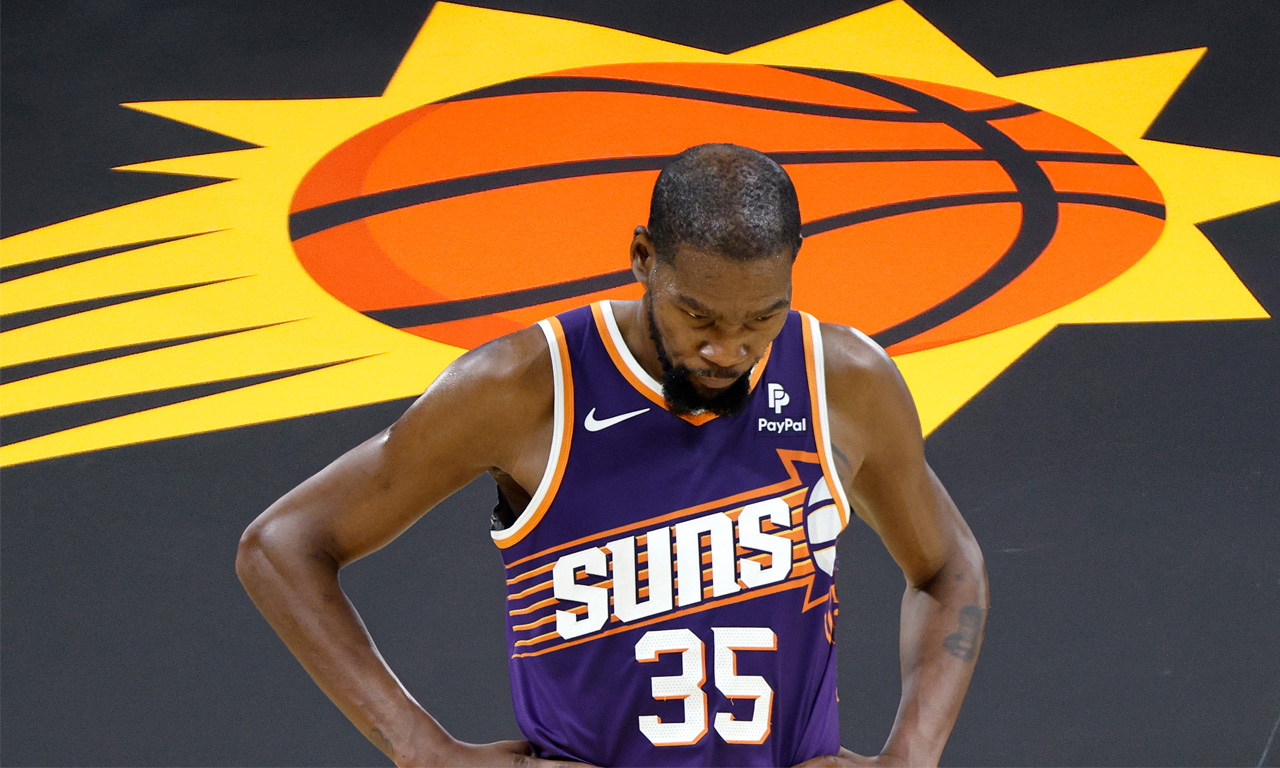
As the Houston Rockets set to host the Phoenix Suns tonight, it seems the right time to take a look back at the trade that linked these two franchises together for the foreseeable future.
This past June, the Rockets made a trade with Brooklyn that sent back to the Nets control of their 2025 and 2026 unprotected first-round picks. In exchange, the Rockets received a large chunk of Phoenix’s future (2025, 2027, 2029) and control of the Dallas Mavericks’ 2029 first.
In essence, the Rockets traded one pick and one swap for two picks and two swaps. All unprotected.
Thoughts At The Time of the Trade
If I’m going to discuss the current outlook of this trade, I have to be honest about how I saw it at the time of the move. While I didn’t hate this trade initially, I definitely didn’t love it either.
I liked that the Rockets increased their overall trade assets. I also liked that they extended the timeline to be able to make a bigger trade and I also appreciated that they kept control of the 2027 Brooklyn swap.
But I didn’t like that the Rockets gave up what seemed like the more established value (Brooklyn) for a more uncertain gamble (Phoenix). The Rockets did not control a “tanking runway” of picks to offer back to Phoenix — all of the picks Houston got in the deal were in staggered years (’25, ’27, ’29). I also felt Brooklyn, who badly needed to rebuild, got away with paying market value to get their picks back despite the fact that the Rockets invested years in watching those picks appreciate up to the point that they had the Nets completely over a barrel.
Net-net: I felt like more certainty was traded for less certainty and it was more of an equitable trade for both teams rather than Brooklyn paying dearly to get back the things only the Rockets could offer.
There were two ways I thought this trade could pay dividends: The Suns needed to flame out immediately, as in this season (unlikely), or the Rockets could trade all those pick assets as part of a deal for a real superstar in the next 12-18 months (more likely).
In a testament to how quickly change can occur in a very unpredictable NBA, four things have happened that have been positive indicators for the Rockets in making this move.
The Suns are fading
While Phoenix had major salary cap issues, dealing with the second apron, they didn’t appear to have problems on the court. They jumped out of the gate 8-1 and looked like a legitimate contender behind their star trio of scorers in Kevin Durant, Devin Booker and Bradley Beal.
Given Houston controlled Phoenix’s pick this year via a swap, it looked like the Rockets would come up empty-handed on the trade this season.
That changed quickly.
Injuries, serious depth concerns and a lack of a defensive identity has sent Phoenix spiraling. Booker’s availability has been inconsistent, forcing Durant to carry the load, while Beal has not quite fit in at all. Their financial limitations, thanks to owner Mat Ishbia’s all-in spending spree, have handcuffed their ability to improve the roster around the three stars.
The Suns are sitting 11th in the West, having gone 22-34 since that hot start, and are currently trying to catch a depleted Dallas squad to get back into the play-in picture.
As of right now, the Rockets project to end up with a lottery pick (albeit a late one) this season out of the trade.
Phoenix was caught shopping Durant
Because the Suns struggled so hard after the start, they tried to make a major move at the deadline but could not unload Beal, in large part due to his no-trade clause.
As a result, they may have made a misstep: They openly tried to trade Durant, which inevitably became public news.
Now? Durant will almost assuredly be traded this summer — likely to a destination that he handpicks. This means the Phoenix Suns will have to look at all possibilities for their future, including potentially having to give Rafael Stone and the Rockets front office a call.
But keep in mind, the Rockets can not offer Phoenix the ability to completely rebuild via the draft right now. Phoenix’s 2026 pick is controlled by Washington. They would have to get extremely creative to set that stage. A retool in Phoenix is much more likely.
Could Brooklyn have been better than expected?
This one is tougher to gauge.
The Brooklyn Nets are currently tied for fifth-worst team in the league, giving them strong lottery odds this summer. This was expected. After all, the Nets, even with a healthy Mikal Bridges and a full roster, were not a good team last season, closing the year 20-41 in the final three quarters of the season. The Rockets ended up with the #3 pick (Reed Sheppard) as a result of Brooklyn’s mediocrity.
However, if the Rockets had not placed that pick back in Brooklyn’s hands, would the Nets be better than this?
Brooklyn brought in a new coach in Jordi Fernandez that has had a positive impact. They have dumped off players, such as Dennis Schroeder and Dorian Finney-Smith, that impacted winning. The bar to make the play-in in the East (.415 winning percentage) is obscenely low, with Brooklyn being just five wins away from it at the moment.
And on top of that, Brooklyn did have lots of draft capital that they could have moved to try to win now.
It’s very tough to say as you don’t know if a team with Bridges still in Brooklyn might have actually been worse than this current squad, but you could make a case that the pick the Rockets would have ended up with from Brooklyn this season would be eerily similar to the one they will end up getting from Phoenix this year.
Again, this is a tough call.
Nico Harrison Hooked the Rockets Up
As part of the trade, the Rockets got control of the Dallas Mavericks’ 2029 first-round pick (unprotected, of course). While there’s really no way of knowing what a pick will be five years out, we did know that Luka Doncic would be just 29-30 years old that season and it was fairly etched in stone that he would be the core piece of a Dallas squad that season.
Enter chaos in Dallas.
Doncic was shipped out in the trade that shocked the world, which could have a major impact on the Rockets. Dallas’ current core of Kyrie Irving and Anthony Davis will be 37 and 36 years old that season, respectively.
On paper, the value of that pick shot up.
Final Summary
Right now, the outlook on these picks looks strong. One source stated off the record that they feel the 2029 Phoenix pick is the best pick asset out there that is owned by another team. The Rockets would be reluctant to add that one specifically into any trade unless it’s for a truly legitimate star.
But if there is any lesson that the NBA teaches us over and over again, it’s that it’s very hard to predict where a team will be a year from now, much less three years from now.
Can the Rockets pressure Phoenix and leverage the ownership they have of their draft capital to get what they really want (Booker) from them? Could a Suns retool around Booker and Beal, with the right pieces and assets acquired from a Durant trade, significantly change their on-court outlook and cap sheet — which in turn could damage the value of the picks Houston controls?
Bottom line is it has worked out well this season, and the future forecast at the moment is promising. The current value of those future picks appears strong. What will likely determine history’s final grade for this trade will be how it sets them up for the trade to come, and that’s where fans will be looking to Stone and the front office for action starting this summer.
Houston Rockets
Amen Thompson’s ankle injury will be re-evaluated in one week
“The things he does you can’t replicate,” says Rockets coach Ime Udoka
Published
4 months agoon
March 10, 2025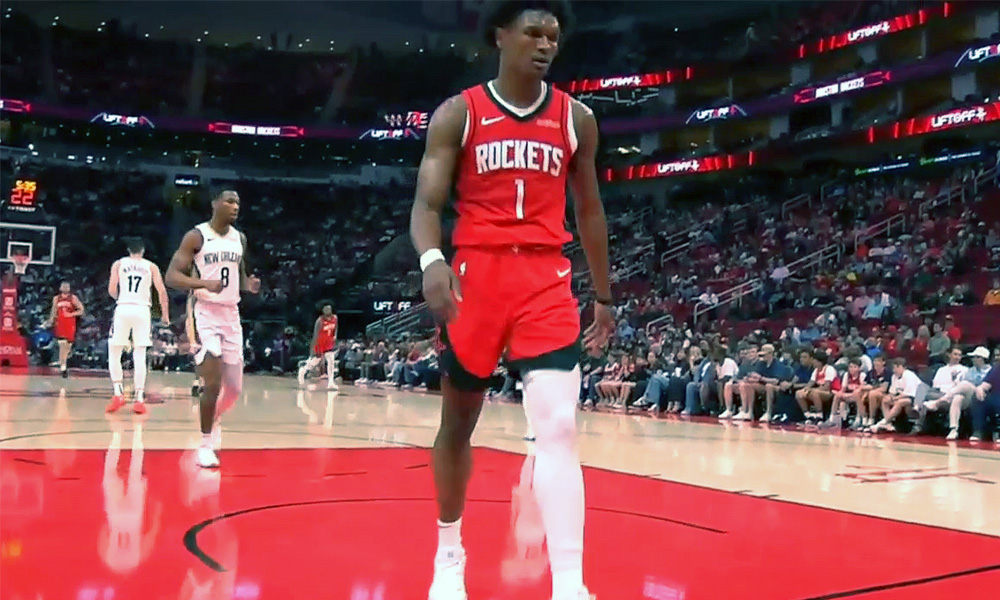
Rockets young star Amen Thompson will have his ankle injury re-evaluated in one week, according to Ime Udoka.
Thompson had an MRI on Sunday and the Rockets coach confirmed all imaging (X-ray, MRI) was negative.
“Just some swelling and pain, obviously,” said Udoka.
If you listen to Udoka, you can tell he knows how special Amen is to this team. He said the Rockets are missing a lot by not having him out there.
“Obviously, the things he does you can’t replicate,” said Udoka. “[Amen is] a guy that plays every position for us. When one goes down, he runs the point. If another is out, he runs the four.”
Amen is one of the best defensive players in the game, and as a one-on-one defender of guards/wings, he might already be the best in the league in just his second season. He’s holding his opponents to 40.5% shooting from the field, tops in the league.
“He’s a very unique defensive player,” said Udoka. “We got some guys that do some great things there, but I like to put him and Dillon on the best two usually, night to night. You got Tari and that’s a luxury as well, but the way he goes about it is different. His athleticism, size, speed, strength, shotblocking ability, steals… he’s all over the place.”
“Hard to replicate for sure.”
Amen injured his ankle late Saturday night in a blowout win against the Pelicans, but the unfortunate part was he probably should not have been on the floor in the first place.
The Rockets left Amen Thompson in the game in a blowout to get one more rebound for a triple-double and he just got injured. He's heading to the locker room with a limp. https://t.co/UBtrEpgWuU pic.twitter.com/D8GeKP8sQk
— ClutchFans (@clutchfans) March 9, 2025
The Rockets had built well over a 30-point lead by early fourth quarter. Jalen Green was able to rest the entire fourth. Alperen Sengun came out of the game with 7-8 minutes left while Dillon Brooks and Tari Eason came out with 6:00 left. But Thompson, who had posted an insane +39 on-off number, remained in the game because he was one rebound shy of a triple-double with 15 points, 11 assists and nine rebounds.
Udoka addressed that decision on Monday before the game against Orlando.
“What I typically don’t do is wholesale substitutions,” said Udoka of the decision to keep Amen in the game. “Albeit 30[-point lead] at six minutes [left] is different than losing to Minnesota, a 16-point lead with four minutes [left].”
“I’ve seen it go both ways in the past. You take out guys too early and have to bring starters back, and vice versa.”
Thompson has played in 60 games this season, five short of being eligible for postseason awards. He absolutely should be up for an All-Defensive nod this season so keep an eye on him getting back in time for that. He would need to return to action no later than April 4th for the game against the OKC Thunder in order to play enough games to be eligible.
Houston Rockets
How the Kyrie Irving Injury Impacts Rockets
Houston’s draft positioning and offseason plans could be impacted by Dallas
Published
4 months agoon
March 4, 2025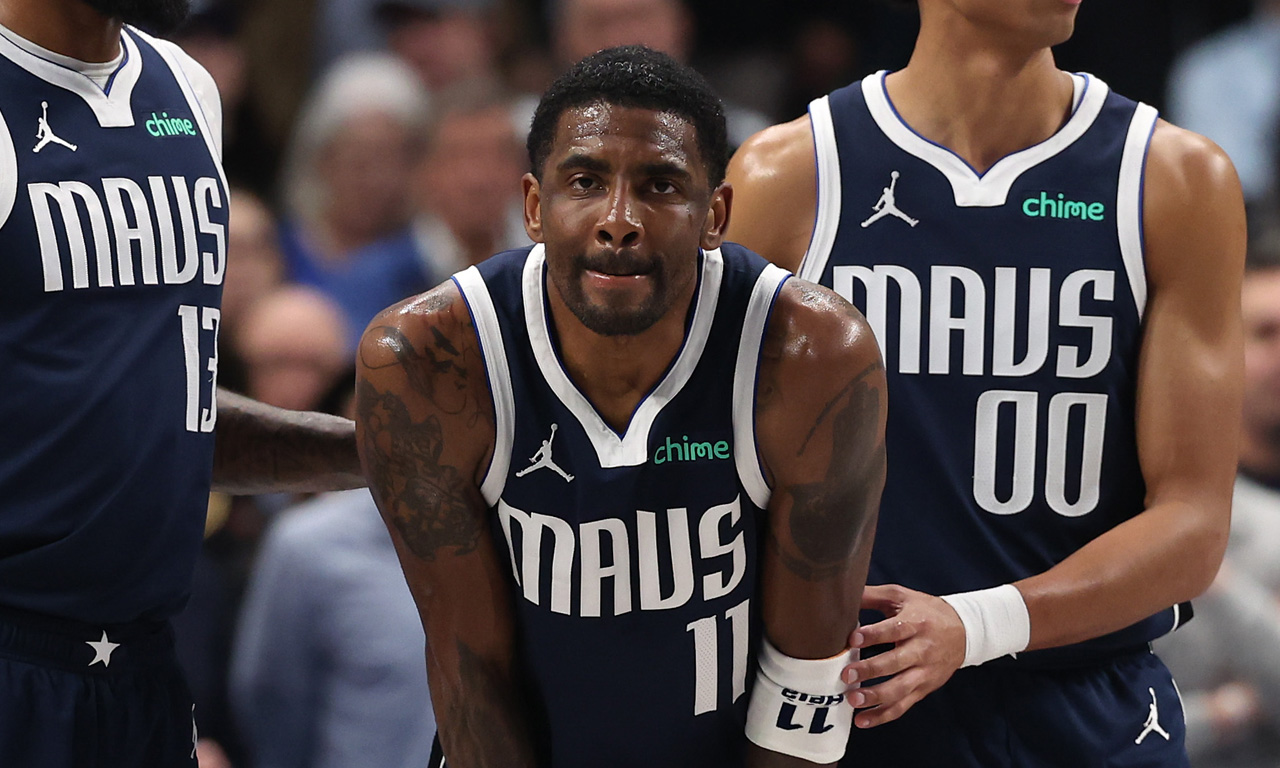
Dallas Mavericks guard Kyrie Irving was injured Monday night and the news dropped on Tuesday that the knee injury is serious — a torn ACL in his left knee that will end his season and a good portion of next season as well.
Brutal. I can’t think of an NBA team that imploded faster than the Dallas Mavericks.
You trade away a 25-year-old phenom who just hoisted you on his back en route to the NBA Finals a year ago. You cashed in that golden ticket to go all-in on a trio of aging stars in Kyrie, Anthony Davis, and Klay Thompson.
Bold strategy, Nico. Let’s see if it pays off.
(Narrator: It’s not paying off.)
The Mavericks had some interesting potential this year and maybe the next couple of years once everyone was healthy, but now? Their star guard is likely out until the calendar year 2026 and Klay and AD aren’t getting any younger nor more durable. The Mavericks may have actually swapped their future for a present that never arrives — and Dallas GM Nico Harrison has to be feeling overwhelming pressure right now.
So how does this impact the Rockets?
For starters, Houston has a game remaining on the schedule against Dallas on March 14th at Toyota Center — Davis may or may not be back for that game.
More importantly, Dallas is the 10th seed in the West at the moment, just 3.5 games ahead of the Phoenix Suns (11th seed). The Rockets control Phoenix’s first-round pick unprotected this season via a swap. We need as many West teams as possible ahead of Phoenix to keep them out of the play-in/playoffs and to push them as deep into the lotto as possible.
This complicates that. Phoenix’s remaining schedule is the toughest in the NBA by a good margin, with plenty of games left against the league’s best teams, so it still looks promising overall — but we’re talking about Kevin Durant, Devin Booker and Bradley Beal. They can still get hot at the right time while Dallas may struggle.
So keep a close eye on that. The good news is the Portland Trail Blazers are one of the hottest teams in the league and they are (shockingly) nipping at the Arizona squad’s heels.
Taking a look ahead to the offseason, the Kevin Durant Pursuit will be big.
This one is a little more complicated for Houston. The Rockets really want Devin Booker but, as of now, the Phoenix plan appears to be to trade KD this offseason and retool around Booker. The Rockets will have interest in Durant but they’re not going to sell the farm (prospects and all the picks) for a 37-year old like they would for Booker.
Three teams that I’ve heard a lot about from Rockets circles that will be in the mix are Houston, Minnesota and Dallas — Timberwolves and Mavericks have been considered the main competition. But, a lot of this will depend on Durant himself and where he wants to play at this stage of his career.
Keep in mind also, if the Suns are “retooling” around Booker and Beal (holding the no-trade clause), then they could be placing a higher priority on win-now players over the return of their own draft assets. The Rockets definitely have the best assets overall to offer up in any trade package between those three teams, but if Phoenix does prefer finding the right ready-to-win players around Booker/Beal, that gives Dallas and Minnesota a real chance.
This injury “may” take Dallas out of the equation, and they are/were definitely a contender for KD’s services given his past relationship with Kyrie and the way Dallas was positioned to win right now. Does KD at his age want to wait for Kyrie to be healthy?
And one last friendly reminder: The Rockets control that Dallas 2029 first (unprotected).
Houston Rockets
Rockets Sign David Roddy to Two-Way Contract
Former first-round pick has played with the Grizzlies, Suns and Hawks
Published
4 months agoon
March 3, 2025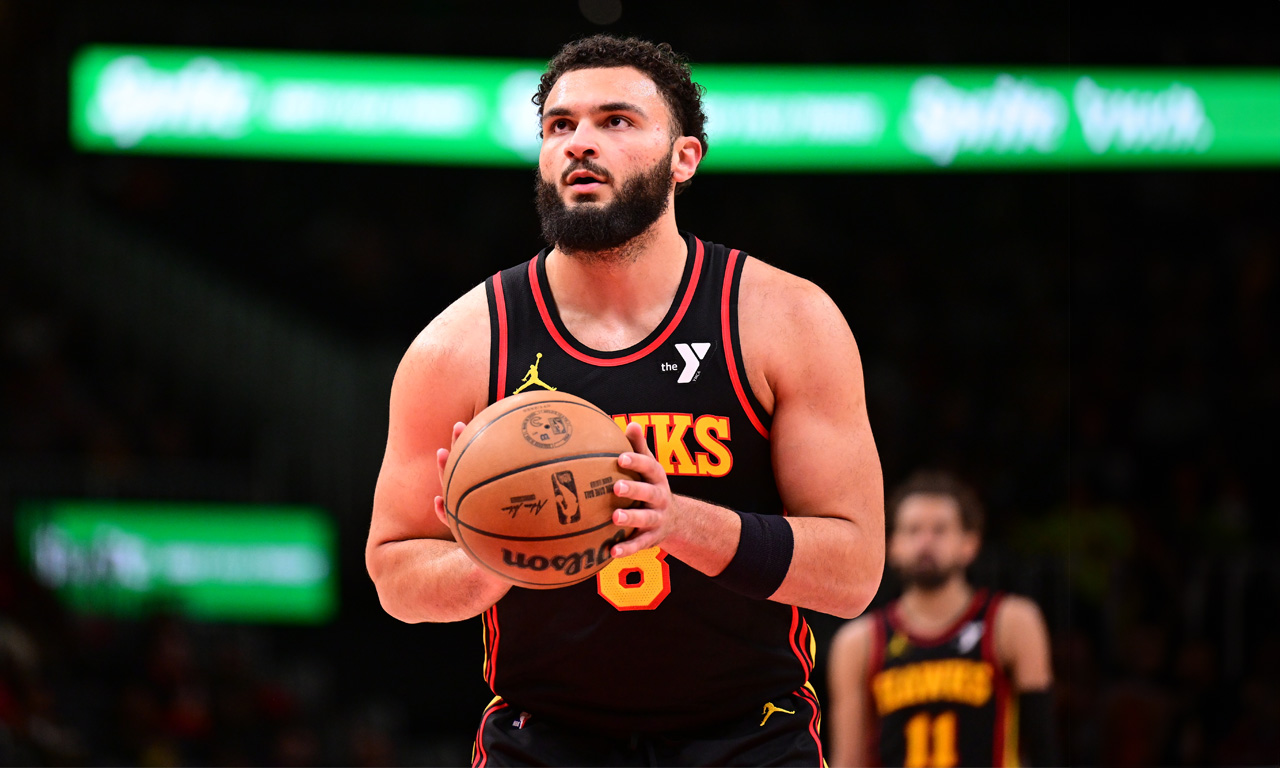
The Rockets made a move on Monday, signing former first-round pick David Roddy to a two-way contract.
The two-way spot opened up after the front office signed Jeenathan Williams to a standard four-year, $8.2 million contract (with friendly team options all along the way).
Roddy is 6-foot-5 and 250+ pounds but sports a 6-foot-11 wingspan. He was taken with the 23rd pick in the first round of the 2022 NBA Draft — six selections after the Rockets drafted Tari Eason. A standout in college, Roddy averaged 19.2 points, 7.5 rebounds, 2.9 assists, 1.2 steals, and 1.1 blocks per game during his junior season at Colorado State.
Roddy, who turns 24 later this month, is a physical player who can play multiple positions. He’s a solid rebounder for his size/position. He has played in 165 games over three seasons with the Grizzlies, Suns, Hawks and most recently Sixers, averaging 6.2 points and 2.9 rebounds per game.
The guard/forward has not shown efficient shooting, however — he’s a career 30.5% three-point shooter and just 68.4% from the line. His defense is better inside than out.
Ultimately, it will be those two things — three-point shooting and defense — that will determine his chances of carving out a consistent role in the league.
All in all, it’s a low-risk signing and the Rockets get a look at a prospect that fits their age timeline.
Houston Rockets
Houston a potential landing spot for Ben Simmons post-buyout?
Published
5 months agoon
February 6, 2025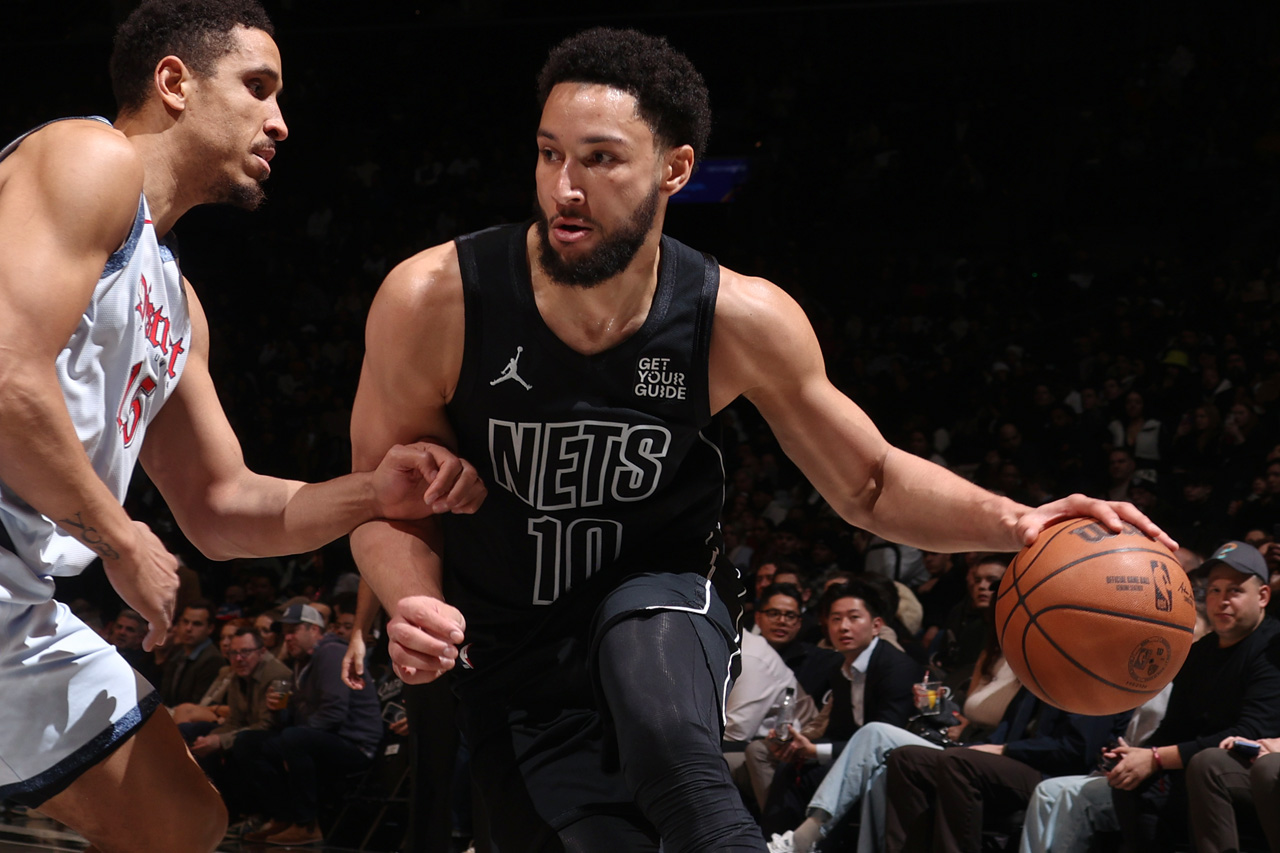
ESPN NBA analyst Brian Windhorst said on Thursday’s NBA Trade Deadline show that Brooklyn Nets forward Ben Simmons is working on a buyout and the Houston Rockets is a potential landing spot for him.
“Cleveland and Houston are two situations for Ben Simmons,” said Windhorst.
Brian Windhorst says the Cavaliers and Rockets are buyout locations for Ben Simmons.
Thoughts? pic.twitter.com/7ly4mvmxr5
— ClutchFans (@clutchfans) February 6, 2025
Advertisement
Rockets coach Ime Udoka was an assistant coach in Philadelphia in 2019-20 when Simmons was with the Sixers, before injuries took a significant toll. In fact, Udoka, when speaking about Amen Thompson earlier this season, brought up some comparisons to Simmons.
“The skill set is there, and it’s something that’s unique with his speed, athleticism, size, passing ability, and all those things,” said Udoka of Thompson. “I coached somebody, Ben Simmons, who had similar traits… as far as size and ability to push the pace, and find guys and finish. There are some similarities there.”
Both Thompson and Simmons are known for their elite athleticism, defensive versatility, and ability to create opportunities in transition.
However, can Simmons help the Rockets today? That’s the tough question.
Simmons has played in 33 games this season, averaging 6.2 points, 6.9 assists, 5.2 rebounds, 0.8 steals and 0.5 blocks in 25 minutes a night. He does not shoot threes (like, at all) — he has only attempted two threes in the past three seasons combined.
Ideally, he does not play in front of your young forwards of Amen, Tari Eason and Jabari Smith Jr. and on that basis alone, I think I would pass. But, Ime loves defensive dogs and he could use some extra ballhandling on the roster. You can see that there’s little in the way of offensive organization when Fred VanVleet is out.
There would be a comical full circle moment though if the Rockets did sign Ben Simmons, considering the Rockets were heavily criticized for trading James Harden in 2021 to Brooklyn instead of to Philadelphia for Simmons. The Rockets clearly made the right choice there.

